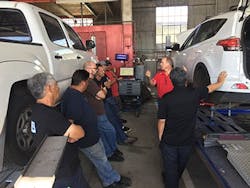Calming employee concerns about their future when selling your collision repair business
When I’m working with the owner of a collision repair business who is interested in selling his or her company, questions related to employees often come up. When do I tell my employees about the sale? How do I deal with rumors? How do I alleviate their fears about what the sale means regarding their job security, seniority or other changes?
Luckily, I have some personal experience with this, having sold my multi-shop business to a larger MSO back in 2015. I understand that the first thought that goes through employees’ minds when they hear the business is for sale is gloom and doom, thoughts such as: where will I stand with the new company in terms of pay, vacation time and other benefits, seniority, etc.
But a business owner can easily relieve a lot of the anxiety employees might have about a sale by presenting it in the right light. About a month before closing the sale of my business, I brought my management team together to let them know what was happening. The message I conveyed: This is a necessary business decision to protect your future and the entire company from poor consolidation.
What did I mean by that? If you’re just selling to the highest bidder, that could be poor consolidation for your team. The highest bidder might plan on closing locations or implementing a different production model or, worse, set you back a few years with their processes. They might have a culture that won’t blend with the one you’ve developed at your company. Your company might be more of a “specialist” when the highest bidder is more of a “generalist.” I always recommend that sellers keep their employees’ best interests in mind as they evaluate buyers (who, if you own your building, also could be your tenant for the long haul).
As I talked with my team that day, just as I speak with potential sellers now, I focus on the upside for them. The sale was going to offer them a chance to enjoy an even better benefit package that only a larger organization could offer. It was going to offer them more opportunities for advancement. The national relationships the buyer had would likely improve both the scale and consistency of the workload coming into the shop.
There are also steps a seller can take within a sales agreement to protect his or her staff. Having employee turnover just before or after the transaction isn’t good for the buyer or seller, so both sides have an interest in working to ensure that doesn’t happen. Most asset purchase agreements include a clause that guarantees at least 90 percent of employees will stay on board for a specified period of time. You usually don’t have to worry about people jumping ship with the news if it’s clear their interests were taking into account.
My announcement to my management team came a bit earlier in the process than is usual. It’s more common to make the sale known just one or two weeks before closing. That time is needed to make sure any insurance company or vendor agreements can be transitioned. If you wait until the closing date to try to do that, there’s likely going to be disruptions to workflow, payroll, etc.
In my case, the rumors about a potential sale became too “loud” to wait, thus my meeting with managers about a month before closing. Such rumors can be challenging. It’s always hard to know how they develop. Someone may overhear a conversation. It could be just a suspicion that turns into a rumor – that someone takes as fact. There’s a lot of ways these things blow up.
In any case, letting my team know what was happening and helping them understand the direction of the company helped smooth out the process and relieve their concerns. That’s probably even easier to do today than it was in the early days of consolidation; it’s become so commonplace now.
Sellers should work with the buyer to coordinate when and how to tell employees. The buyer and seller usually do this “early announcement” together, meeting with the whole staff of the business being acquired, or just with the leadership team followed by meetings at each location.
Regardless of when it takes place, the key to letting your team know about the sale is to focus on the steps you and the buyer have taken to ensure the change will be a good one for all involved.




